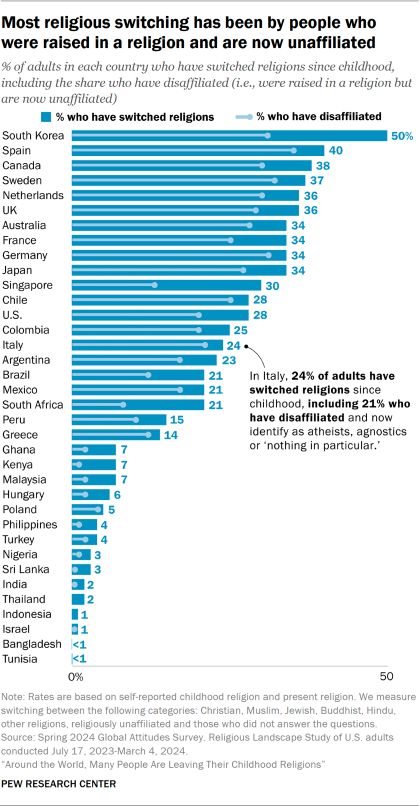A new Pew Research Center study offers compelling insights into religious switching worldwide. ‘Religious switching’ includes ceasing to be religious or changing religion. Christianity, particularly in Western and high-income nations, is undergoing significant transformation. The study, spanning 36 countries (excluding Ireland), reveals a notable decline in Christian affiliation, primarily driven by individuals abandoning their childhood faith.
The Pew study shows that in nations like Spain, Sweden, the Netherlands, Germany, Canada, the United Kingdom, France, Australia, Chile, the United States, and Italy, about 20pc of adults no long count themselves as member of the Church in which they were raised. In the UK, it is much higher, with 38pc of those raised Christian now identifying as religiously unaffiliated. Consequently, the unaffiliated (46pc) in the UK now outnumber self-identified Christians (43pc).
The findings would seem on the surface to contradict a recent survey in Britain which shows that a mini-religious revival is taking place among some young people there. But there is really no contradiction, because in the wider society people who were nominally Christian are now saying they are not Christian at all, leading to an overall fall in religious identification, while a growing number of those who remain Christian are returning to church.
Not all religious switching involves abandoning faith; some move toward religion. Among the 36 countries examined, South Korea leads, with 9pc of adults raised without religion now identifying with a faith, including 6pc who have become Christian.
In the United States, the proportion of adults identifying as Christian fell from 78pc to 62pc between 2007 and 2023–24. However, Christianity’s decline has stabilised recently, with 29pc of adults now unaffiliated, a figure unchanged since 2021.
In countries like Spain, almost all religious switching is from Christianity (Catholicism in the vast number of cases) to no religion, or at large to no other Church, but in a country like Brazil, a large number of people switch to another form of Christianity, typically from Catholicism to Pentecostalism.
Despite losses in some parts of the world, Christianity is growing in others. Singapore, for instance, has seen a net gain in adherents. Similarly, the Philippines, Nigeria, and Hungary exhibit high Christian retention, with nearly all adults raised Christian remaining in the faith. Nigeria and the Philippines have tens of millions of Catholics.
If you look at the table above, you will see that the countries where Christianity is declining fastest, are the ones seeing their populations rapidly ageing as fewer and fewer babies are being born.
Overall, the data highlight a global shift in religious identity. While Christianity remains a major world religion, its dominance is waning in some regions, particularly the West, due to rising disaffiliation.
However, Christianity, including Catholicism, is growing in parts of the world with fast population growth, especially sub-Saharan Africa, where many conversions are also taking place.
PS. The study also looks at other religions and what is happening to them. To summarise; hardly anyone switches from Islam, Hinduism or Judaism. Many leave Buddhism in countries like South Korea and Japan but very few in Sri Lanka and Thailand.

















